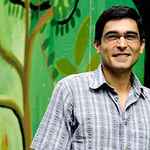Study programme
-
Introduction to Latin American StudiesPeriod 16
-
Latin American Studies: Deepening the DebatesPeriod 16
-
Interdisciplinary Methods and Research DesignPeriod 2Period 312
-
Research on Latin American SocietiesPeriod 4Period 512
-
Restricted-choice electivesPeriod 26
You choose: Approaches to Popular Culture in Latin America: Researching Heritage and Worldmaking OR Political Ecology of Latin America: Sustainability and Environmental Justice Struggles.
-
Master's Thesis Latin American StudiesPeriod 5Period 618
-
Introductory courses
These courses introduce key subjects and approaches in contemporary Latin American Studies from different disciplines which provide knowledge and understanding of a range of societal contexts in Latin America.
-
Research project: research proposal and methodology
The research project is the core of the Master’s programme which represents over half of the programme’s credits. You will elaborate a research plan to investigate one specific topic, and will conduct field research in Latin America. You are encouraged to combine your own research interests and academic background with the research projects and expertise of one of the programme teachers. The research project has three stages.
During stage 1 you will elaborate your research project during the Interdisciplinary Methods course, in which methodological principles and tools from different disciplines are presented, discussed and applied to particular contexts. During this course, you will present your research proposal and will receive feedback from the programme teachers and your class mates.
You will also deepen your knowledge in your particular field of interest through individually selected literature on a theme or process in Latin America during the tutorial, you will deepen your academic expertise further with support from your supervisor or another Master’s programme teacher.
During stage 2 you will spend 2,5 months in Latin America to independently conduct field research. During this period, you will make contacts with people relevant to your research, conduct interviews, make structured observations, and collect secondary data.
During stage 3 you will analyse the research data and write your thesis, as described above.
-
Restricted-choice electives
Restricted-choice electives provide more in-depth knowledge on particular theories and academic debates in Latin American studies from which students can elaborate their research question. Students choose one of the following two courses:
- Socio-Environmental Changes in Latin America
You will learn and reflect on current debates on the effects of economic activities, political decisions and social conditions of the environment in Latin America.
- Political Ecology of Latin America: Sustainability and Environmental Justice Struggles
This course will introduce a critical perspective on socioenvironmental change in Latin America. The course will address how economic and power structures, multicultural perspectives and ecological processes interplay in shaping society-nature relations in this increasingly interconnected region with the global processes.
All students must follow a tutorial (see below), too. However, they may also take an elective course elsewhere instead.
-
Tutorial
In your tutorial (Lectura Guiada), you will deepen your knowledge in your particular field of interest which usually ties in with your research project. Through individually selected literature on a theme or process in Latin America, you will deepen your academic expertise further with support from your supervisor or another Master’s programme teacher.
-
Research project: writing your thesis
You will write your Master’s thesis in the final stage of your research project. In addition to your individual meetings with your supervisor, you will follow the Thesis Seminar. This course is designed to support you during the analysis of your research data and the writing of your thesis.
-
Pre-PhD track
Students who have concluded the programme with good results and interested in developing their academic skills further are encouraged to join LASP. The LASP is the interuniversity Latin American Studies Programme and prepares students for a research career. The pre-PhD-track is not accredited.

The research projects of the students form the core of the Master’s programme. It is a challenging programme, especially because of the fieldwork in Latin America. As teachers we are very involved in the students’ projects. We often learn as much from them as they from us.Dr Fabio de Castro
-
How many students does the programme have?
The Master’s has on average 20 students per year, from various nationalities and academic backgrounds.
-
What is the tuition fee?
Because this is a post-initial Master’s, the full tuition fee is €3.000,- per year.
For Dutch students this means that you can study a regular Master's programme before or after our Master's without the additional costs (‘instellingsgeld’) of a second Master's.
For international students this means that our tuition fee is the same for all of our international students, European, (Latin) American, or global (no additional costs for non-EU residents). Moreover, everybody is eligible for a €1.000,- fieldwork grant upon completion of the course load prior to the field research period.
-
What is the post-initial Master's programme?
A "post-initial Master's degree" or “advanced Master’s degree” typically refers to a graduate-level academic programme that one pursues after completing their initial Master's degree. It's a way for individuals to further specialise or expand their knowledge in a particular field beyond what they gained in their first Master's programme.
For the Master Latin American Studies, Bachelor students are also accepted if they have sufficient social science research skills.
-
How well should I know Spanish or Portuguese?
As part of our curriculum, your foreign language skills are expected to be at a level sufficient enough to conduct research in Latin America. This means that we require proficiency in either Spanish or Portuguese, or (in some cases) a language of the Caribbean or Guyanas. It is not necessary to do a DELE test (or an equivalent thereof), but part of the application interview may be in this language, to test your language skills.